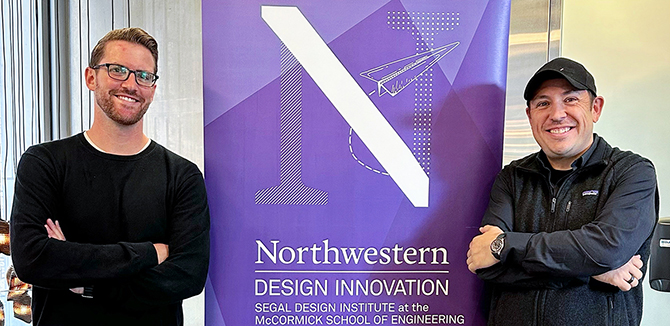The Tone-Setters
Will Hubbard and Marty Ringlein teach the introductory course in the mpd² program and sharpen the entrepreneurial focus for the new students.

Will Hubbard and Marty Ringlein are co-teaching the Introduction to Product Design and Development course this fall in Northwestern Engineering's Master of Product Design and Development Management (mpd²) program. This class marks the beginning for the new cohort of mpd² students, setting the tone for the entire program.
Both Hubbard and Ringlein understand the importance of that responsibility.
“At our core, we’re entrepreneurs, and we take that with us in everything we do,” Ringlein said. “Everything ultimately comes down to a balance between your customer and your customer’s customer — in this case, being a steward of the university and delivering value to the students.”
That value partly comes from the long careers Hubbard and Ringlein have built on a foundation of innovation and risk-taking.
Hubbard is currently a general partner with Adventure Fund, which invests in early-stage startups and late-stage industry disruptors. For more than a decade, he has been creating and developing products in a variety of hardware and software technology companies. He also serves as a general partner with Venture Studio, an incubator for startups.
Ringlein also is a general partner with Venture Studio. He has been either creating or developing products for more than two decades and built startups acquired by Eventbrite and X, formerly known as Twitter.
The teaching tandem said their role teaching the first course for students in the mpd² program is important for reasons beyond trying to instill more than mere knowledge, but rather a mindset toward product development.
“You have to be different,” Hubbard said. “You can't just continually go with the flow and do what the crowd is doing. You have to be comfortable with things not initially working with the hope that one day they will and have the understanding that it's going to take a lot of shots on goal to eventually have one that scores.”
This course isn’t new to the mpd² program, but Hubbard and Ringlein redesigned it this year to ensure its lessons were in line with the expectations companies have for top-notch graduates of industry-leading masters programs.
“We want to ensure that the students are exposed to the fundamentals in context of the latest best practices, the most recent case studies, and the most emerging technologies,” Ringlein said. “This sometimes means updating our slides days or even hours before the lecture.”
The course also has an updated focus on what is already proving to be a disruptive technology in the product-development industry – generative artificial intelligence (AI). Both instructors said they want students to embrace AI’s potential to help and not fear the threat it might pose to certain jobs.
That means understanding that AI can be used as an effective tool as students advance in their careers, assisting them in hiring precisely the right person to fill out a team, or coming up with starting-point design files to pass off to a human team for improvement.
“With generative AI, you’re never starting with a blank canvas again,” Ringlein said. “There’s no more writer's block or blank document that you're writing. You’re moving so much faster than you did before, and to me, that's an ultimate superpower.”
Hubbard agreed.
“There's not an area of modern work life that generative AI won't touch,” he said. “Understanding and using it to its fullest capabilities and being on the forefront of that is going to do a lot of great things for people in product design and development.”
